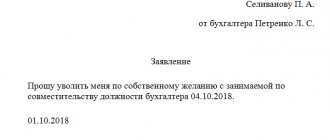Features of getting a job without registration
Let's take a closer look at whether it is possible to hire employees without registration and registration.
What the law says
The provisions of the regulations establish that a person has the right to work. At the same time, the application of any restrictions, including the presence of registration in a strictly established place, in relation to this right leads to discrimination of this person. And labor legislation defines a ban on establishing any types of discrimination when hiring employees.
In this regard, an employer can hire an employee even if he does not have a permanent or temporary registration. The rules of law on the question of whether a citizen of the Russian Federation can work without registration do not prohibit doing so.
Employers often refuse such an appointment due to the fact that such a person will be very difficult to contact if necessary. He will not be able to send a letter to his home address as in normal situations. Therefore, in relation to this employee, the notification procedure becomes more complicated.
Important! However, if the company's management refuses a candidate for a vacancy due to his lack of registration, they may be held liable.
This rule also applies in a situation where an employee’s registration has expired, but he is in no hurry to renew it. The employer does not have the right to demand this, much less terminate the employment agreement due to the end of registration.
Recommendations for reporting
Since the ban on refusal of employment due to lack of registration at the employee’s place of residence puts the employer in an ambivalent position, special care should be taken when preparing reports for such employees.
In this situation, the following actions of the employer are possible:
- In the employment contract signed with the employee when hiring him, as well as in personal accounting documents, the address of his actual residence should be indicated, making a special footnote in the document “According to the employee.”
- When filling out reporting forms submitted to regulatory authorities and containing information about the address of an individual (for example, 2-NDFL), if the employee does not have temporary registration at the place of residence, the address columns should be filled out, indicating the place of permanent registration of the employee (according to data from his passport).
- If there is no temporary registration, and the employee is discharged at the place of permanent registration on the date of drawing up the report, you can enter the address of his previous permanent registration indicated in the passport in the report. If you have temporary registration and do not have a permanent one, you can indicate the address of your temporary place of residence.
- If there is no information about permanent registration in the passport at all, and there is no temporary registration, the address column cannot be left empty - such a report will not be accepted, because it will not pass verification, and it will not be possible to generate it electronically. In this case, a report without indicating the employee’s address will have to be submitted only in “paper” form, attaching a letter with a request to accept the reporting on paper, and with an explanation of why the line about the address of a citizen of the Russian Federation is not filled in - due to the lack of temporary and permanent registration. As confirmation, you must attach photocopies of the first five pages of the employee’s passport, incl. and a blank page about registration. When the employee is registered, it is necessary to submit an updated report with information about the place of residence included in it.
Mandatory registration for Russian citizens and labor migrants
The norms provide for the obligation of Russian citizens to undergo the registration procedure if they reside in a given place for more than 90 days.
Registration does not require any costs. However, it entails reporting to regulatory authorities where this person lives, and this may lead to the disclosure of rental agreements.
Many people who currently rent out housing to others try to hide this income from taxation, so they prefer not to officially show it. Therefore, workers are often left without temporary registration.
Attention! However, the law requires these persons to undergo at least a temporary registration procedure. Otherwise, administrative measures in the form of a fine may be applied to these persons. This rule applies to migrant workers.
Until July 2021, such persons could register at the location of their employer. However, new regulations that came into force last year require migrants to register at their place of actual residence. They must do this as soon as their old registration ends.
You might be interested in:
Investigation of industrial accidents: what is subject to investigation, in what time frame, procedure, compensation
Employer problems
At the same time, despite the fact that labor law clearly establishes that employment without registration is carried out in the same way as if the applicant had registration at the place of location of the enterprise, for the employer the employment of an employee without registration can be problematic, and this is primarily due to with tax reporting.
In the fundamental legislative acts that guide business entities regarding the employment of citizens without registration at the location of the enterprise, an ambiguous situation arises - a conflict of legal norms.
On the one hand, the employer does not control and is not responsible for the registration of his employee or applicant for a vacancy, and on the other hand, if it is not available at his location, he cannot fulfill the mandatory requirement for filing tax reports, since some reporting forms contain a column , which must indicate the employee’s registered address.
When is registration mandatory?
The law determines that some positions can be employed only if you have permanent registration at the place of work. We are talking about public service in fiscal authorities, customs, and law enforcement agencies. If employment is carried out there, then you must take care of registration in advance.
Also, the requirement for mandatory residence registration applies to foreign citizens. If he wants to carry out labor activities on the territory of Russia, he must obtain a permit to do so. If such permission is not issued, the employer has the right to refuse employment.
There is no need to check the registration of a foreigner in the following cases:
- If a foreigner who has a residence permit is hired;
- When hiring citizens from the EAEU.
Employment without registration or with temporary registration, law
The main regulatory act that regulates the procedure for carrying out labor activities is the Labor Code of the Russian Federation.
It directly establishes that the employer is obliged to hire a citizen without registration (both permanent and temporary). In fact, the process of employment and hiring a person directly depends on the place of his stay and residence indicated in the passport.
Of course, it is more profitable for the employer to hire an employee who lives at the location of the workplace in order to avoid delays, transfers, etc.
Refusal to conclude an employment contract with an employee on the grounds of lack of permanent or temporary residence at the place of work is illegal.
In addition to the Labor Code, the regulator of this issue is the resolution of the plenum of the Supreme Court. Of course, this act does not have the force of law, but the courts, when making their decisions, use exactly the recommendations that the plenum established.
Employment with temporary registration at the place of residence
When a citizen comes to another region to earn money, the last thing he usually thinks about is the need to have temporary registration. However, employers very often make such a requirement of their applicants. And not everyone understands the legality of this requirement.
In fact, it is already illegal to make such a demand on an employee. The Labor Code of the Russian Federation contains a list of documents that must be provided when applying for a job. This list is closed - employers can reduce it, but do not have the right to expand it with their own documents. The current version of this list does not include documents confirming temporary registration.
The Supreme Court adheres to exactly the same position, which directed other types of courts to pay attention to the fact that an employer’s refusal to provide employment due to lack of registration is illegal. Such a requirement on the part of the employer violates the right to freedom of movement and choice of place of residence.
Attention! At the same time, employees themselves must remember that the law requires temporary registration if their stay in another city or region exceeds 90 days. Violation of this clause may result in administrative liability.
Is it possible to do this?
There are two forms of residence registration:
- Permanent - the address of residence is indicated in the passport; in case of a change in permanent registration, you must provide data to the migration service about the new place of residence within seven days after the change.
- Temporary – it is necessary to obtain temporary registration if your stay in a new place lasts more than 90 days; when registering a temporary residence permit, a certificate indicating the new address is issued.
According to the legislation of the Russian Federation, a citizen is required to have a temporary or permanent registration, but its absence is not a legal reason for refusing an applicant a job. Nevertheless, among employers you can find those who, under the pretext of another legitimate reason, refuse to hire an applicant without registration.
If the position in question is related to the public service, for example, a law enforcement officer, customs officer, etc., then the citizen must still have an official place of residence.
An important point is the presence of Russian citizenship . If the applicant does not have the appropriate citizenship, then in order to be employed he must register and have a work permit, in accordance with the Labor Code of the Russian Federation.
Can an employer refuse to hire an employee?
The information that you cannot get a job if you are not registered in the region of work is based on the labor legislation of the USSR. There really was such a limitation.
Currently, the legislation of the USSR is not in force, and the Labor Code of the Russian Federation and other regulatory documents do not contain this requirement. Therefore, whether it is possible to hire a person without registration in an organization, management should not establish this restriction.
At the same time, the law prohibits the establishment of any restrictions based on the employee’s place of residence. Thus, the administration is obliged to conclude an employment agreement with anyone who wishes to do so, if he meets the required business qualities, without taking into account information about registration or registration. There are also no penalties for hiring an employee without local residence or registration.
Important! If an employer refuses registration for this reason, then he violates the Constitution of the Russian Federation, the Labor Code of the Russian Federation, and federal laws. If such a fact is revealed, the company may be held liable.
Employment in Moscow, pitfalls
Citizens, in accordance with Russian legislation, have the right to move freely throughout the territory of our country. To do this, you do not need to obtain temporary registration in each city of residence, including Moscow.
Of course, employers are reluctant to hire people without registration. This is due to the fact that an employee can disappear at any time, which will negatively affect the activities of the organization. This is especially applicable to situations where employees occupy a high position or are financially responsible.
For employment in Moscow for lower positions, as a rule, registration is not required. Migrants who do not have the necessary documents are often hired, as they are cheap labor. However, by hiring people unofficially, the employer and employee risk facing many difficulties, so this is not recommended.
Many companies in Moscow prefer to hire Muscovites. Analyzing judicial practice, we can come to the conclusion that cases in court regarding refusal of employment due to lack of registration are considered quite often. As a rule, courts practically do not make positive decisions on these disputes. This is due to the fact that it is almost impossible to prove the true reasons for the refusal. Not a single employer directly refers to this reason.
conclusions
Currently, registration (permanent or temporary) is of great importance. When workers move to another area, they must understand that they have an obligation to register during a long stay in a given territory.
The administration must answer positively the question of whether it is possible to work in a company without registration, since labor legislation does not provide for this requirement. If an employer tries to take administrative measures against an employee due to lack of registration, he will be punished in accordance with the law.
What is the difference between urgent registration and permanent registration?
In accordance with the provisions of the law “On the right of citizens of the Russian Federation to freedom of movement, choice of place of stay and residence within the Russian Federation” No. 5242-1 of June 25, 1993, citizens are required to register at their place of residence or stay.
Place of residence is an indication of where a citizen resides permanently. A mark on registration of residence is registration, permanent registration, the stamp is entered in the passport (Article 3 of Federal Law No. 5242-1).
Place of stay is an indication where a citizen does not stay permanently, for more than 90 days (paragraph 7, article 2 of Federal Law No. 5242-1). Registration at the place of stay is limited in duration, it is confirmed by a certificate.
Documents required for employment
Labor legislation regulates the list of documents for employment.
In accordance with Art. 65 of the Labor Code of the Russian Federation, a citizen provides:
- passport;
- work book or information about work activity;
- SNILS;
- military ID;
- document on education, if special skills are required;
- in some cases - a certificate of no criminal record.
The answer to the question of whether temporary registration is needed for work is negative, since the list of documents does not include a document about the place of residence. The employer does not have the right to demand documents not provided for by labor legislation (paragraph 3 of article 65 of the Labor Code of the Russian Federation).
Negative aspects that may arise when finding employment without registration
The main question that arises when trying to get a desired job without registration or at least temporary registration in a given city is what threat does this pose to the employer or employee? Is this action an offence?
For employee
The main difficulty for a future employee is the job search itself. Refusal to hire due to lack of temporary or permanent registration is illegal, but usually the employer explains his refusal for other reasons. Only the high qualifications of the applicant, combined with the shortage of specialists in this profile, will help convince the employer of the opposite.
In cases where the hiring has nevertheless taken place, but there is no registration at the place of stay or residence, you need to be prepared to risk answering for the lack of registration in rubles.
In accordance with Art. 19.15.1 of the Code of Administrative Offenses of the Russian Federation, residence of citizens at the place of stay or at the place of residence in a residential building without registration is an administrative offense and is subject to punishment in the form of a fine from 2000 to 3000 rubles. (in Moscow and St. Petersburg this amount rises to 5,000 rubles).
More information: fine for late registration (registration) of a child or adult, for late registration. ⇐
In addition, the lack of registration can give rise to a lot of difficulties with various tax and pension contributions, which can ultimately lead to confusion in the databases of the tax office and the pension fund.
When it is strictly forbidden to hire without registration
According to the laws of the Russian Federation, citizens have the right to get a job without registration.
However, there are exceptions to this rule. Only permanent registration will give you the opportunity to obtain official registration in such budget organizations as:
- government agencies;
- law enforcement agencies;
- courts of any level;
- customs services.
Registration is required for visitors from other countries. When employing a migrant, the employer must check the legality of his stay in Russia. In addition, citizens of other states need to confirm the right to work on our territory.
To do this, the foreigner must present:
- migration card;
- patent;
- health insurance.
From 2021, control over taxi drivers has been strengthened. Only a foreigner who has received a patent for this type of activity can now become a taxi driver.
You don’t have to check your residence permit for people from other countries if:
- this is a citizen of the EAEU;
- have a residence permit.
Foreigners coming to the Russian Federation must contact the Main Directorate for Migration Issues of the Russian Ministry of Internal Affairs and register there. If the manager hires such an employee, he must submit information about his hiring or dismissal to the Ministry of Internal Affairs.
There is a special case when registration is required. If the position involves financial responsibility, then you will have to come to terms with the obligation to obtain permanent or temporary registration.
This is explained by the need to sign an agreement indicating the actual address of residence. It will be used to search for an employee if the company learns about a shortage, embezzlement or loss of company property.
Memo for employers
Memo for employers: how to formalize labor relations with persons located in the territory of the Russian Federation on the basis of a residence permit, temporary residence permit, as well as those with refugee status, temporary asylum
1 question:
What legal acts should an employer follow when hiring a foreign citizen?
Answer:
The main regulatory acts of the Russian Federation regulating the specifics of the labor activity of foreign citizens in Russia are the Labor Code of the Russian Federation (hereinafter referred to as the Labor Code of the Russian Federation), in particular Ch. 50.1 of the Labor Code of the Russian Federation, and Federal Law dated July 25, 2002 No. 115-FZ “On the legal status of foreign citizens in the Russian Federation” (hereinafter referred to as Federal Law dated July 25, 2002 No. 115-FZ).
2. Question:
What should you first pay attention to when hiring a foreign citizen or stateless person?
Answer:
1. First, you need to find out on what basis a foreign citizen is on the territory of the Russian Federation.
It is necessary to clearly understand that, depending on the mode of stay (residence), foreigners can be divided into permanently or temporarily residing in the territory of the Russian Federation and temporarily staying in the territory of the Russian Federation, as follows from paragraph. 10, 11, 12 p. 1 art. 2 of the Federal Law of July 25, 2002 No. 115-FZ.
2. Which document in this or that case is an identification document of a foreign citizen or stateless person.
3. It is necessary to know what permits a given person with a particular legal status needs to apply for a job.
Usually, to attract foreign workers, an organization must obtain permission to use foreign workers (Clause 4, Article 13 of Federal Law No. 115-FZ of July 25, 2002). But there are exceptions to this rule.
To carry out labor activities in the Russian Federation, a work permit or patent is not required for the following categories of persons:
- those who permanently reside in Russia on the basis of a residence permit;
- those who temporarily reside in the Russian Federation on the basis of a temporary residence permit;
- having refugee status in the Russian Federation;
- persons who have been granted temporary asylum on the territory of the Russian Federation.
4. Based on the peculiarities of the legal status of a foreign citizen or stateless person on the territory of the Russian Federation, it is necessary to know whether this person has the right to carry out labor activities within the subject of the Russian Federation of interest.
3. Question:
Features of employment for a foreign citizen or stateless person with a residence permit?
Answer:
First you need to understand what a residence permit is? According to paragraph 8, paragraph 1, article 2 of the Federal Law of July 25, 2002 No. 115-FZ, this is a document issued to a foreign citizen or stateless person to confirm their right to permanent residence in the Russian Federation, as well as their right to freely leave the Russian Federation and entry into the Russian Federation.
A residence permit issued to a stateless person is also a document proving his identity (clause 3, clause 2, article 10 of the Federal Law of July 25, 2002 No. 115-FZ).
Clause 3 Art. 8 of Federal Law No. 115-FZ of July 25, 2002 provides that a residence permit is issued without a limitation on the validity period.
A foreign citizen permanently residing in Russia does not require a work permit or a patent to carry out work activities (clause 1, clause 4, article 13 of Federal Law No. 115-FZ of July 25, 2002).
Since no restrictions are established by law, such a foreign citizen has the right to carry out labor activities throughout the entire territory of the Russian Federation.
4. Question:
Features of employment for a foreign citizen or stateless person with a temporary residence permit?
Answer:
According to paragraph 7, paragraph 1, article 2 of the Federal Law of July 25, 2002 No. 115-FZ - confirmation of the right of a foreign citizen or stateless person to temporarily reside in the Russian Federation until receiving a residence permit, issued in the form of a mark in the identity document of the foreign citizen or a stateless person, or in the form of a document of the established form issued in the Russian Federation to a stateless person who does not have a document proving his identity.
In this case, the identity document will be:
1) a document issued by a foreign state to a stateless person (for example, a passport of a stateless person, travel document) with a note on receipt of a temporary residence permit in the Russian Federation;
2) temporary residence permit (in the form of a separate document).
The validity period of this permit is three years (Clause 1, Article 6 of Federal Law No. 115-FZ of July 25, 2002).
A foreign citizen temporarily residing in the Russian Federation does not require a work permit or a patent to carry out labor activities in the Russian Federation; however, as a general rule, he can work only in the constituent entity of the Russian Federation in whose territory he is allowed temporary residence (clause 1, clause 4, p. 5 Article 13 of the Federal Law of July 25, 2002 No. 115-FZ).
Such a foreign citizen can work on the territory of other constituent entities of the Russian Federation in cases established by Order of the Ministry of Health and Social Development of Russia dated July 28, 2010 No. 564n. For example, according to clause 2 of the Appendix to the said Order, a foreign citizen temporarily residing in the Russian Federation has the right to carry out labor activities outside the boundaries of the subject of the Russian Federation in whose territory he is allowed temporary residence, if he performs work in certain professions and positions listed in this paragraph, in the following cases:
a) the employee is sent on a business trip. The total duration of labor activity of a foreign citizen outside the specified constituent entity of the Russian Federation in this case cannot exceed 40 calendar days within 12 calendar months;
b) permanent work is performed by the employee on the road or is of a traveling nature and this is determined by his employment contract. The total duration of labor activity of a foreign citizen outside the specified constituent entity of the Russian Federation in this case cannot exceed 90 calendar days within 12 calendar months.
5. Question:
Features of employment for a foreign citizen with refugee status?
Answer:
A refugee is a person who is not a citizen of the Russian Federation and who, due to fear of becoming a victim of persecution on the basis of race, religion, citizenship, nationality, membership of a particular social group or political beliefs, is outside the country of his citizenship and cannot (does not want) to use protection of this country due to fear; or, not having a specific citizenship and being outside the country of his previous residence as a result of such events, cannot (does not want) to return to it due to fears (Clause 1 of Article 1 of the Federal Law of February 19, 1993 No. 4528-1 “On Refugees” (hereinafter referred to as Federal Law of February 19, 1993 No. 4528-1)).
In this case, the identity document will be a refugee certificate (clause 7, article 4 of the Federal Law of February 19, 1993 No. 4528-1).
The certificate is issued for the period of recognition of its owner as a refugee, but not more than 3 years (clause 3 of the Regulations on the registration, issuance and exchange of a refugee certificate, approved by Decree of the Government of the Russian Federation of May 10, 2011 No. 356).
A person with refugee status does not need a work permit or a patent to carry out work activities (clause 11, clause 4, article 13 of Federal Law No. 115-FZ of July 25, 2002).
This person can carry out labor activities within the region of the Russian Federation, where he is registered with the territorial migration authority as a person who has been granted refugee status (exceptions - work on a rotational basis, business trips, work with daily travel from the place of stay to the place of work and back ).
6. Question:
Features of employment for a foreign citizen or stateless person located on the territory of the Russian Federation on the basis of temporary asylum?
Answer:
Temporary asylum may be granted to a foreign citizen or stateless person if they:
1) have grounds for recognition as a refugee, but are limited to a written application with a request for the opportunity to temporarily stay in the territory of the Russian Federation;
2) do not have grounds for recognition as a refugee under the circumstances provided for by this Federal Law, but for humanitarian reasons cannot be expelled (deported) from the territory of the Russian Federation (clause 2 of Article 12 of the Federal Law of February 19, 1993 No. 4528-1).
A certificate is issued to a person who has received temporary asylum for the period of its provision, but not more than one year (clause 2 of Order of the Ministry of Internal Affairs of Russia dated September 28, 2017 No. 741 “On approval of the Procedure for registration, issuance and exchange of a certificate of temporary asylum for territory of the Russian Federation...").
For this category of persons, the identification document will be a certificate of temporary asylum in the territory of the Russian Federation (Clause 3 of Article 12 of the Federal Law of February 19, 1993 No. 4528-1).
A person who has received temporary asylum does not need a work permit or a patent to carry out work activities (Clause 12, Clause 4, Article 13 of Federal Law No. 115-FZ of July 25, 2002).
Carries out labor activities within the region of the Russian Federation, where he is registered with the territorial migration authority as a person who has been granted temporary asylum (exceptions - work on a rotational basis, business trips, work involving daily travel from the place of stay to the place of work and back).
7. Question:
What documents are required to conclude an employment contract with a foreign citizen?
Answer:
When hiring a foreign citizen, in accordance with Art. Art. 65, 327.3 of the Labor Code of the Russian Federation must present to the employer, in particular, the following documents:
1) passport or other identity document;
2) work book, if not, then the employer must issue it;
3) insurance certificate of state pension insurance. If this is the first place of work for a foreigner, then the employer must issue an insurance certificate;
4) a voluntary medical insurance agreement (policy) valid on the territory of the Russian Federation (only for persons with a temporary residence permit). This document is not needed if the employer has entered into an agreement with a medical organization to provide paid medical services to a foreign employee;
5) a document on education, qualifications or special knowledge - when applying for a job that requires special knowledge or special training.
6) a certificate of the presence (absence) of a criminal record and (or) the fact of criminal prosecution or the termination of criminal prosecution on rehabilitative grounds - when applying for a job related to activities to which persons who have or have had a criminal record are not allowed (receive from the Federal Public Institution " Main Information and Analytical Center of the Ministry of Internal Affairs of the Russian Federation" at the address: Moscow, Novocheremushkinskaya St., 67).
7) a certificate stating whether a person is or is not subject to administrative punishment for the consumption of narcotic drugs or psychotropic substances without a doctor’s prescription or new potentially dangerous psychoactive substances - when applying for a job related to activities to which persons punished for the specified offenses, until the expiration of one year from the date of completion of the execution of this resolution.
Military registration documents are not required for foreign citizens (Part 3 of Article 327.3 of the Labor Code of the Russian Federation). For the GPC agreement, the same documents are requested, except for the work book (based on Article 65 of the Labor Code of the Russian Federation).
8. Question:
Are there any other peculiarities when concluding an employment contract with foreign citizens?
Answer:
There are a few other common features:
- An employment contract can only be concluded with a foreigner who has reached the age of 18, unless otherwise established by federal laws (part 3 of article 327.1 of the Labor Code of the Russian Federation, paragraph 1 of paragraph 4 of article 13 of the Federal Law of July 25, 2002 No. 115-FZ).
- An employment contract with a foreign citizen must contain all the necessary information and mandatory conditions provided for in Art. 57 Labor Code of the Russian Federation. In addition, the employment contract must include the following information and conditions:
1) for foreigners temporarily staying in Russia:
- information about a work permit or patent, except for cases established by federal laws or international treaties of the Russian Federation (paragraph 2, part 1, article 327.2 of the Labor Code of the Russian Federation);
- a condition for providing the employee with medical care during the term of the employment contract, including details of a voluntary health insurance agreement (policy) or an agreement between the employer and a medical organization for the provision of paid medical services to the employee (except for cases established by federal laws or international treaties of the Russian Federation). These contracts (policies) must ensure the provision of primary health care and specialized medical care in an emergency manner. This is established by Part 2 of Art. 327.2 Labor Code of the Russian Federation;
2) for foreigners temporarily residing in Russia:
- information about a temporary residence permit in Russia, except for cases established by federal laws or international treaties of the Russian Federation (paragraph 3, part 1, article 327.2 of the Labor Code of the Russian Federation);
3) for foreigners permanently residing in Russia:
- information about a residence permit, except for cases established by federal laws or international treaties of the Russian Federation (paragraph 4, part 1, article 327.2 of the Labor Code of the Russian Federation).
9. Question:
For how long can an employer enter into an employment contract with a foreign citizen or stateless person?
Answer:
An employment contract with a foreigner can be concluded either for a certain period or for an indefinite period. At the same time, a fixed-term employment contract is concluded only in the cases provided for in Art. 59 Labor Code of the Russian Federation. This is provided for in Part 5 of Art. 327.1 Labor Code of the Russian Federation.
10. Question:
Who and how must be notified about the hiring or dismissal of a foreign worker?
Answer:
In accordance with paragraph 8 of Art. 13 of Federal Law No. 115-FZ of July 25, 2002, the employer is obliged to notify the territorial migration authority of the conclusion or termination of an employment contract with a foreign citizen. Such notification must be made by sending the appropriate document in paper or electronic form within a period not exceeding three working days from the date of conclusion of the employment contract in accordance with Order of the Ministry of Internal Affairs of Russia dated January 10, 2018 No. 11 (notification forms are attached - Appendix 1 and 2).
According to the position of the Supreme Court of the Russian Federation, this obligation arises for the employer even in the case where there is no employment contract with the employee in writing (Resolution No. 25-AD10-6 dated July 14, 2010).
The forms and procedure for submitting notifications about the conclusion and termination (termination) of employment (civil law) contracts with foreigners are approved by Order of the Ministry of Internal Affairs of Russia dated January 10, 2018 No. 11.
Information is provided regarding each foreigner hired for work. The notification form must be filled out legibly in Russian by hand or using technical means. The use of abbreviations, strikethroughs and corrections is not permitted. This follows from paragraphs 3, 4 of the Procedure for the submission by employers or customers of work (services) of notifications on the conclusion and termination (termination) of employment contracts or civil contracts for the performance of work (provision of services) with foreign citizens (stateless persons) ( hereinafter referred to as the Procedure for Submitting Notifications) given in Appendix No. 15 to Order No. 363 of the Ministry of Internal Affairs of Russia dated June 4, 2019.
If the notification is submitted on paper directly to the migration department, then the person who submits it must present documents proving his identity and authority, which follows from the content of clause 7 of the Procedure for submitting notifications. Confirmation that the notification has been received is a certificate of acceptance of the notification (Appendix No. 2 to the Procedure for Submitting Notifications) issued to the employer (customer of work (services)) or his representative by the responsible official of the relevant department. This follows from paragraph 3, clause 8 of the Procedure for submitting notifications.
If the notification is sent to the migration department in electronic form, then the official, no later than the working day following the day of receipt of such a document, sends an electronic message about the receipt of the notification to the person who submitted it. This is indicated in clause 9 of the Procedure for Submitting Notifications.
11. Question:
What personal income tax rate applies in this or that case?
Answer:
In this matter, it is again important to pay attention to what legal status a foreign citizen or stateless person has.
For persons who are on the territory of the Russian Federation on the basis of a residence permit or temporary residence permit, personal income tax is calculated at a rate of 13%, the tax base is determined on an accrual basis using deductions, since usually persons from this category are tax residents (located on the territory of the Russian Federation at least 183 calendar days during the year).
If a foreigner is not a tax resident of the Russian Federation, then the tax rate will be 30% and there will be no deductions for personal income tax (Article 224 of the Tax Code of the Russian Federation).
Labor income (including vacation pay) of an employee who has received temporary asylum or refugee status in the Russian Federation is subject to personal income tax at a rate of 13%, regardless of whether he is a tax resident or not (paragraph 7, paragraph 3, article 224 of the Tax Code of the Russian Federation, Letter from the Ministry of Finance Russia dated 04/01/2016 No. 03-04-06/18552).
12. Question:
What fees must be paid?
Answer:
For all categories of foreign citizens, the employer must pay the following contributions:
- to the Pension Fund of Russia - a rate of 22% within the limit and 10% above it (clause 2, clause 1, article 425 of the Tax Code of the Russian Federation);
- to the Compulsory Medical Insurance Fund - the rate is 5.1% (clause 2, clause 2, article 425 of the Tax Code of the Russian Federation);
- to the Social Insurance Fund - the rate is 2.9% (clause 3, clause 2, article 425 of the Tax Code of the Russian Federation).
13. Question:
What administrative responsibility is provided for the employer in this or that case?
Answer:
| Violations | Person held accountable | Responsibility measures | Norm |
| Involving a foreigner in labor activities outside the boundaries of the constituent entity of the Russian Federation in whose territory he was issued a work permit, patent or temporary residence permit | Citizen | Fine from 2 thousand to 5 thousand rubles. | Part 1 art. 18.15, note to art. 18.1 Code of Administrative Offenses of the Russian Federation |
| Executive | Fine from 25 thousand to 50 thousand rubles. | ||
| Entity | Fine from 250 thousand to 800 thousand rubles. or administrative suspension of activities for a period of 14 to 90 days | ||
| Individual entrepreneur | |||
| Failure to notify or violation of the procedure and (or) form of notification to the territorial body of the federal executive body exercising federal state control (supervision) in the field of migration about the conclusion or termination (termination) of an employment contract or a civil contract for the performance of work (rendering services) with by a foreign citizen within a period not exceeding three working days from the date of conclusion, termination (termination) of the contract, if such notification is necessary in accordance with federal law | Citizen | Fine from 2 thousand to 5 thousand rubles. | Part 3 Art. 18.15, note to Art. 18.1 Code of Administrative Offenses of the Russian Federation |
| Executive | Fine from 35 thousand to 50 thousand rubles. | ||
| Entity | Fine from 400 thousand to 800 thousand rubles. or administrative suspension of activities for a period of 14 to 90 days | ||
| Individual entrepreneur | |||
| Provided by Parts 1 - 3 of Art. 18.15 Code of Administrative Offenses of the Russian Federation, violations that were committed in Moscow, St. Petersburg, Moscow or Leningrad region | Citizen | Fine from 5 thousand to 7 thousand rubles. | Part 4 art. 18.15, note to art. 18.1 Code of Administrative Offenses of the Russian Federation |
| Executive | Fine from 35 thousand to 70 thousand rubles. | ||
| Entity | Fine from 400 thousand to 1 million rubles. or administrative suspension of activities for a period of 14 to 90 days | ||
| Individual entrepreneur | |||
| Failure by the employer or customer of work (services) to comply with the restrictions established by federal law on the performance of certain types of activities by foreigners | Citizen | Fine from 2 thousand to 4 thousand rubles. | Part 1 art. 18.17, note to art. 18.1 Code of Administrative Offenses of the Russian Federation |
| Executive | Fine from 45 thousand to 50 thousand rubles. | ||
| Entity | Fine from 800 thousand to 1 million rubles. or administrative suspension of activities for a period of 14 to 90 days | ||
| Individual entrepreneur | |||
| Submitting knowingly false information about a foreigner or forged documents when carrying out migration registration, if these actions do not contain signs of a criminal offense | Citizen | Fine from 2 thousand to 5 thousand rubles. | Part 2 Art. 19.27, note to Art. 2.4 Code of Administrative Offenses of the Russian Federation |
| Executive | Fine from 35 thousand to 50 thousand rubles. | ||
| Individual entrepreneur | |||
| Entity | Fine from 350 thousand to 800 thousand rubles. |
14. Question:
How to fire a foreign citizen or stateless person?
Answer:
Dismissal of a foreign employee is permitted on any of the general grounds provided for in Art. 77 of the Labor Code of the Russian Federation, and is drawn up in accordance with Art. 84.1 Labor Code of the Russian Federation.
At the same time, there are a number of features of terminating an employment contract with a foreign employee, including special grounds for dismissal of such employees.
| Foreigners category | Grounds for dismissal | Norms |
| All foreigners | Bringing the number of foreign workers into compliance with restrictions on labor activities established by federal laws, decrees of the President of the Russian Federation, and decrees of the Government of the Russian Federation | Clause 9, Part 1, Art. 327.6 Labor Code of the Russian Federation |
| Temporarily staying in the Russian Federation | 1. Suspension, expiration, cancellation of permission to attract and use foreigners | Clause 1 part 1 art. 327.6 Labor Code of the Russian Federation |
| 2. Cancellation of work permit or patent | Clause 2, Part 1, Art. 327.6 Labor Code of the Russian Federation | |
| 3. Expiration of a work permit or patent | Clause 5, Part 1, Art. 327.6 Labor Code of the Russian Federation | |
| 4. Expiration of the validity period of a VHI agreement (policy) on the territory of the Russian Federation or termination of the agreement concluded by the employer with a medical organization on the provision of paid medical services | Clause 8, Part 1, Art. 327.6 Labor Code of the Russian Federation | |
| 5. The impossibility of providing the employee with the previous job after the end of the temporary transfer period in accordance with Part 2 of Art. 327.4 Labor Code of the Russian Federation | Clause 10, Part 1, Art. 327.6 Labor Code of the Russian Federation | |
| 6. Impossibility of temporary transfer of an employee in accordance with Part 3 of Art. 327.4 Labor Code of the Russian Federation | Clause 11, Part 1, Art. 327.6 Labor Code of the Russian Federation | |
| Temporarily residing in the Russian Federation | 1. Cancellation of a temporary residence permit in the Russian Federation | Clause 3, Part 1, Art. 327.6 Labor Code of the Russian Federation |
| 2. Expiration of the temporary residence permit in the Russian Federation | Clause 6, Part 1, Art. 327.6 Labor Code of the Russian Federation | |
| Permanently residing in the Russian Federation | 1. Cancellation of a residence permit in the Russian Federation | Clause 4, Part 1, Art. 327.6 Labor Code of the Russian Federation |
| 2. Expiration of the validity period of a residence permit in the Russian Federation | Clause 7, Part 1, Art. 327.6 Labor Code of the Russian Federation |
Terms for termination of the contract when certain grounds for dismissal are applied
The employment contract is terminated after one month from the date of expiration (clauses 5 - 8, part 1, part 2, article 327.6 of the Labor Code of the Russian Federation):
- work permit or patent;
- temporary residence permits in the Russian Federation;
- residence permit in the Russian Federation;
- an agreement (policy) of voluntary medical insurance or an agreement on the provision of paid medical services in the territory of the Russian Federation.
The employer is obliged to warn the foreign employee in writing no later than three calendar days before dismissal on the following grounds (Part 4 of Article 327.6 of the Labor Code of the Russian Federation):
- impossibility of providing the employee with his previous job after the end of the temporary transfer period in accordance with Part 2 of Art. 327.4 of the Labor Code of the Russian Federation (clause 10, part 1, article 327.6 of the Labor Code of the Russian Federation);
- impossibility of temporary transfer in accordance with Part 3 of Art. 327.4 of the Labor Code of the Russian Federation (clause 11, part 1, article 327.6 of the Labor Code of the Russian Federation).
In some cases, the employer is required to pay foreign workers severance pay in the amount of two weeks' average earnings. For example, in case of dismissal in connection with the reinstatement of an employee who previously performed this work, or in connection with the employee’s refusal to continue work due to a change in the terms of the employment contract determined by the parties (Part 7 of Article 178 of the Labor Code of the Russian Federation).
List of documents issued upon hiring
Hiring involves the issuance by the employer's personnel service of the established documents to create the personal file of the new employee and ensure the employer's personnel records.
Such documents include:
- employment contract;
- employment order (show the order to the employee against signature within 3 days);
- employee personal card.
The forms of these documents are unified and approved by Decree of the State Statistics Committee dated January 5, 2004 No. 1.
For more details, see the material “Personnel documents that must be in the organization.”










